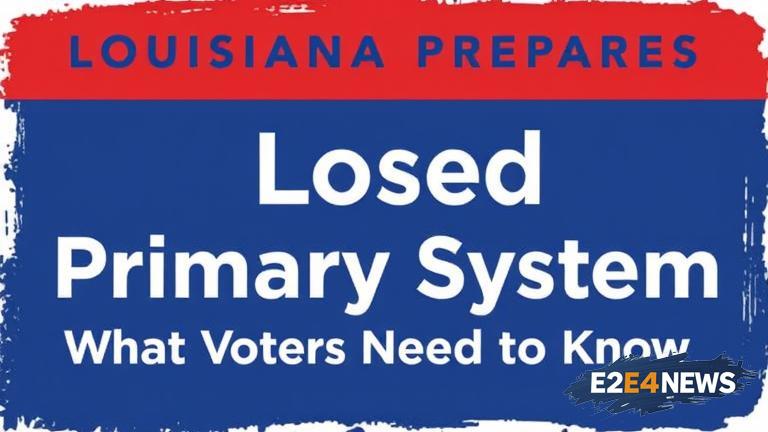The state of Louisiana is preparing to introduce a closed primary system, which will significantly alter the way voters participate in elections. This new system is designed to restrict primary elections to registered party members, aiming to increase party loyalty and reduce crossover voting. As a result, voters will need to be registered with a specific party to participate in that party’s primary election. The closed primary system is expected to have a substantial impact on the state’s electoral landscape, with potential effects on voter turnout, candidate selection, and party dynamics. One of the primary goals of the closed primary system is to reduce the influence of voters from other parties on the primary election outcome. By limiting participation to registered party members, the system aims to ensure that candidates are chosen by those who are truly invested in the party’s values and platform. However, critics argue that the closed primary system may lead to decreased voter turnout, as some voters may feel disenfranchised by the new restrictions. Additionally, the system may favor more extreme candidates, as they may be more appealing to the party’s core base. On the other hand, proponents of the closed primary system argue that it will lead to more cohesive and unified parties, with candidates who are better aligned with the party’s values. The implementation of the closed primary system in Louisiana is expected to be a complex process, requiring significant changes to the state’s electoral infrastructure. The state’s election officials will need to update voter registration rolls, modify voting systems, and educate voters about the new system. Furthermore, the closed primary system may have implications for the state’s election laws, with potential changes to rules governing voter registration, absentee voting, and campaign finance. As the state prepares for the transition, voters are advised to check their registration status and ensure they are registered with the party of their choice. The closed primary system is set to take effect in time for the next primary election, and voters can expect to see significant changes to the electoral process. The new system may also lead to increased party engagement, as voters become more invested in the party’s platform and values. However, some voters may feel that the closed primary system restricts their freedom to vote for the candidate of their choice, regardless of party affiliation. In response to these concerns, election officials are working to educate voters about the new system and ensure a smooth transition. The closed primary system has been implemented in several other states, with varying degrees of success. Some states have seen increased party loyalty and more cohesive parties, while others have experienced decreased voter turnout and increased polarization. As Louisiana prepares to join the ranks of states with closed primary systems, voters and election officials alike are watching with interest to see how the new system will play out. The state’s unique electoral landscape, with a mix of urban and rural areas, may present challenges to the implementation of the closed primary system. Nevertheless, election officials are confident that the new system will lead to more representative and accountable government, with candidates who are truly reflective of the party’s values. In conclusion, the introduction of the closed primary system in Louisiana is a significant development in the state’s electoral landscape, with potential implications for voter turnout, party dynamics, and the overall health of the state’s democracy. As voters prepare for the new system, it is essential to stay informed and engaged, ensuring that the electoral process remains fair, accessible, and representative of the people’s will.





